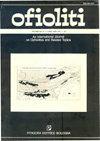圣罗莎增生复合体(哥斯达黎加西北部)早侏罗世至晚白垩世早期放射虫
IF 1.3
4区 地球科学
Q2 GEOLOGY
引用次数: 19
摘要
环太平洋蛇绿岩带;当没有发现其他生物成分时;放射虫有可能提供重要的生物地层信息。圣罗莎增生复合体;它在几个半窗(Carrizal;圣罗莎广场;巴伊亚Nancite;沿着哥斯达黎加西北部圣埃琳娜半岛南岸的普拉亚纳兰霍;是这些鲜为人知的蛇绿杂岩之一。它含有各种海洋碱性玄武岩组合;放射石和多溶角砾岩。本研究提出的放射虫生物年代学主要基于Carter等人(2010)的生物分带相关性;Baumgartner et al. (1995b);O 'Dogherty(1994)的研究表明,与海洋玄武岩相关的沉积物或从角砾岩或巨角砾岩块中回收的沉积物的年龄为早侏罗世至晚白垩世早期(早Pliensbachian至早Turonian)。从Carrizal构造窗口和Sitio Santa Rosa得到的19个组合,共包含65属162种。构造单元的命名是由鲍姆加特纳和丹尼耶提出的;2006)。这项研究揭示了早侏罗世放射石序列的年龄;以前被认为是白垩纪时代的;由碱性玄武岩侵入(第3单元)。早侏罗世在多裂巨角砾岩中存在大型改造块体;由De Wever et al.(1985)首次报道得到证实(Unit 4)。与这两个单元(也许还有5号和8号单元)的放射石相关的碱性玄武岩可能是侏罗纪时代的。加里西构造窗;中至晚侏罗世早期放射虫质燧石块与块状拉斑玄武岩和早白垩世枕状玄武岩上的砖红色带状燧石块相结合,被解释为早白垩世海洋板块增生的中侏罗世海洋基底的碎片;在洋内俯冲的背景下。而;卡里扎尔海Playa的节状放射性长石和黑色页岩显示了中白垩世较浅的古环境。这个海洋盆地的其他遗迹在2号单元;6;和7;记录了早白垩世晚期(阿尔巴尼亚-塞诺曼尼亚)沉积迅速接近俯冲沟;可能到晚白垩纪早期(Turonian)。本文章由计算机程序翻译,如有差异,请以英文原文为准。
EARLY JURASSIC TO EARLY LATE CRETACEOUS RADIOLARIANS FROM THE SANTA ROSA ACCRETIONARY COMPLEX (NORTHWESTERN COSTA RICA)
In the circum-Pacific ophiolitic belts; when no other biogenic constituents are found; radiolarians have the potential to provide significant biostratigraphic information. The Santa Rosa Accretionary Complex; which crops out in several half-windows (Carrizal; Sitio Santa Rosa; Bahia Nancite; Playa Naranjo) along the south shores of the Santa Elena Peninsula in northwestern Costa Rica; is one of these little-known ophiolitic melanges. It contains various oceanic assemblages of alkaline basalt; radiolarite and polymictic breccias. The radiolarian biochronology presented in this work is mainly based by correlation on the biozonations of Carter et al. (2010); Baumgartner et al. (1995b); and O’Dogherty (1994) and indicate an Early Jurassic to early Late Cretaceous (early Pliensbachian to earliest Turonian) age for the sediments associated with oceanic basalts or recovered from blocks in breccias or megabreccias. The 19 illustrated assemblages from the Carrizal tectonic window and Sitio Santa Rosa contain in total 162 species belonging to 65 genera. The nomenclature of tectonic units is the one presented by (Baumgartner and Denyer; 2006). This study brings to light the Early Jurassic age of a succession of radiolarite; which was previously thought to be of Cretaceous age; intruded by alkaline basalts sills (Unit 3). The presence of Early Jurassic large reworked blocks in a polymictic megabreccia; firstly reported by De Wever et al. (1985) is confirmed (Unit 4). Therefore; the alkaline basalt associated with the radiolarites of these two units (and maybe also Units 5 and 8) could be of Jurassic age. In the Carrizal tectonic window; Middle to early Late Jurassic radiolarian chert blocks associated with massive tholeitic basalts and Early Cretaceous brick-red ribbon cherts overlying pillow basalts are interpreted as fragments of a Middle Jurassic oceanic basement accreted to an Early Cretaceous oceanic Plate; in an intra-oceanic subduction context. Whereas; the knobby radiolarites and black shales of Playa Carrizal are indicative of a shallower middle Cretaceous paleoenvironment. Other remnants of this oceanic basin are found in Units 2; 6; and 7; which documented the rapid approach of the depocentre to a subduction trench during the late Early Cretaceous (Albian-Cenomanian); to possibly early Late Cretaceous (Turonian).
求助全文
通过发布文献求助,成功后即可免费获取论文全文。
去求助
来源期刊

Ofioliti
地学-地质学
CiteScore
2.40
自引率
7.70%
发文量
1
期刊介绍:
Since 1976, Ofioliti provides an international forum for original contributions and reviews in the field of the geodynamics, petrology, geochemistry, biostratigraphy, stratigraphy, tectonics and paleogeography applied to ophiolitic terrains and modern oceanic lithosphere, including their sedimentary cover. Studies of topics such as geodynamics of the mantle, the evolution of orogens including ophiolites and paleoceanography are also welcome
 求助内容:
求助内容: 应助结果提醒方式:
应助结果提醒方式:


